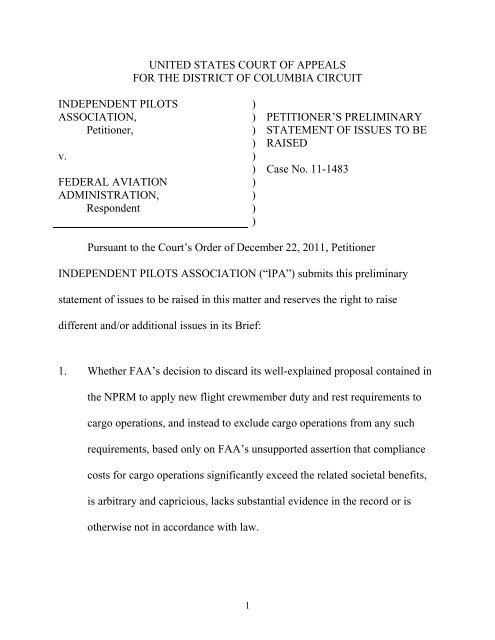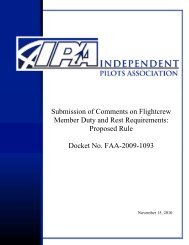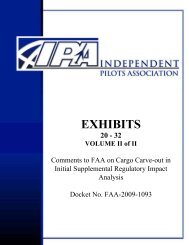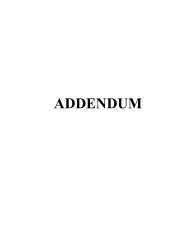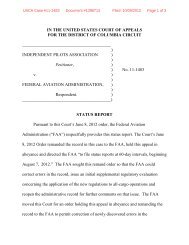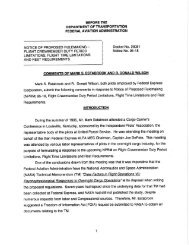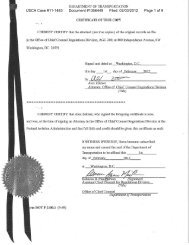Preliminary Statement of Issues to be Raised - Independent Pilots ...
Preliminary Statement of Issues to be Raised - Independent Pilots ...
Preliminary Statement of Issues to be Raised - Independent Pilots ...
You also want an ePaper? Increase the reach of your titles
YUMPU automatically turns print PDFs into web optimized ePapers that Google loves.
UNITED STATES COURT OF APPEALS<br />
FOR THE DISTRICT OF COLUMBIA CIRCUIT<br />
INDEPENDENT PILOTS<br />
ASSOCIATION,<br />
Petitioner,<br />
v.<br />
FEDERAL AVIATION<br />
ADMINISTRATION,<br />
Respondent<br />
)<br />
)<br />
)<br />
)<br />
)<br />
)<br />
)<br />
)<br />
)<br />
)<br />
PETITIONER’S PRELIMINARY<br />
STATEMENT OF ISSUES TO BE<br />
RAISED<br />
Case No. 11-1483<br />
Pursuant <strong>to</strong> the Court’s Order <strong>of</strong> Decem<strong>be</strong>r 22, 2011, Petitioner<br />
INDEPENDENT PILOTS ASSOCIATION (“IPA”) submits this preliminary<br />
statement <strong>of</strong> issues <strong>to</strong> <strong>be</strong> raised in this matter and reserves the right <strong>to</strong> raise<br />
different and/or additional issues in its Brief:<br />
1. Whether FAA’s decision <strong>to</strong> discard its well-explained proposal contained in<br />
the NPRM <strong>to</strong> apply new flight crewmem<strong>be</strong>r duty and rest requirements <strong>to</strong><br />
cargo operations, and instead <strong>to</strong> exclude cargo operations from any such<br />
requirements, based only on FAA’s unsupported assertion that compliance<br />
costs for cargo operations significantly exceed the related societal <strong>be</strong>nefits,<br />
is arbitrary and capricious, lacks substantial evidence in the record or is<br />
otherwise not in accordance with law.<br />
1
2. Whether FAA’s (1) assumption that the only societal <strong>be</strong>nefits <strong>of</strong> applying<br />
the Final Rule <strong>to</strong> cargo operations relate <strong>to</strong> avoiding one fatal cargo accident<br />
instead <strong>of</strong> including non-fatal accidents and taxiing incidents and accidents,<br />
(2) estimate <strong>of</strong> the lost value <strong>of</strong> an aircraft hull as one-eighth the amount it<br />
uses as the estimated market value <strong>of</strong> an aircraft elsewhere in the<br />
rulemaking; and (3) understatement <strong>of</strong> <strong>be</strong>nefits relating <strong>to</strong> one fatal accident<br />
by failing <strong>to</strong> include the avoidance <strong>of</strong> costs, such as, without limitation, (a)<br />
the loss <strong>to</strong> shippers and recipients <strong>of</strong> the value <strong>of</strong> the packages and cargo<br />
aboard the aircraft, (b) the business loss resulting from delays in obtaining<br />
time-sensitive materials, such as critical components for infrastructure<br />
systems and manufacturing facilities, (c) potential lives lost from failure <strong>to</strong><br />
deliver critically needed medical supplies or equipment, as asserted by cargo<br />
carriers in the record, render FAA’s cost-<strong>be</strong>nefit analysis, and thus, the Final<br />
Rule’s exclusion <strong>of</strong> cargo operations, arbitrary and capricious, lacking in<br />
substantial evidence in the record or otherwise not in accordance with law.<br />
3. Whether FAA acted arbitrarily and capriciously or otherwise not in<br />
accordance with law by failing <strong>to</strong> provide an opportunity for interested<br />
parties <strong>to</strong> review and comment on FAA’s cost-<strong>be</strong>nefit calculations that were<br />
FAA’s sole basis for reversing its determination <strong>to</strong> include cargo operations<br />
2
within the scope <strong>of</strong> the proposed rule (NPRM) and exclude cargo operations<br />
from the scope <strong>of</strong> the Final Rule.<br />
4. Whether FAA’s decision <strong>to</strong> exclude cargo operations from the Final Rule is<br />
arbitrary and capricious, lacks substantial evidence in the record or is<br />
otherwise not in accordance with law when FAA had determined that (1) the<br />
prior regulations did not adequately address the risks <strong>of</strong> flightcrew fatigue;<br />
(2) the fac<strong>to</strong>rs that lead <strong>to</strong> fatigue should <strong>be</strong> regulated <strong>to</strong> ensure that<br />
flightcrew mem<strong>be</strong>rs do not accumulate dangerous amounts <strong>of</strong> fatigue; and<br />
(3) fac<strong>to</strong>rs such as night-time operations and flying across multiple time<br />
zones that exacerbate flight crew fatigue, and thus degrade flight crew<br />
performance, are more prevalent in cargo operations than in passenger<br />
operations that are covered by the Final Rule.<br />
DATED: January 23, 2012<br />
William C. Trent,<br />
General Counsel<br />
INDEPENDENT PILOTS<br />
ASSOCIATION<br />
3607 Fern Valley Road<br />
Louisville, KY 40219<br />
(502) 967-0341 ext. 2205<br />
(502) 753-3252 (fax)<br />
btrent@ipapilot.org<br />
By:<br />
/S/<br />
W. Eric Pilsk<br />
epilsk@kaplankirsch.com<br />
Thomas R. Devine<br />
tdevine@kaplankirsch.com<br />
KAPLAN, KIRSCH &<br />
ROCKWELL, LLP<br />
1001 Connecticut Avenue, NW<br />
Washing<strong>to</strong>n, DC 20036<br />
Telephone: (202) 955-5600<br />
Facsimile: (202) 955-5616<br />
At<strong>to</strong>rneys for Petitioner<br />
3
CERTIFICATE OF SERVICE<br />
I HEREBY CERTIFY that on this 23d day <strong>of</strong> January, 2012, I caused <strong>to</strong> <strong>be</strong><br />
served by ECF a true copy <strong>of</strong> the Petitioner’s <strong>Preliminary</strong> <strong>Statement</strong> Of <strong>Issues</strong> To<br />
Be <strong>Raised</strong> on all parties in this matter.<br />
_________________/S/________________<br />
W. Eric Pilsk<br />
5


